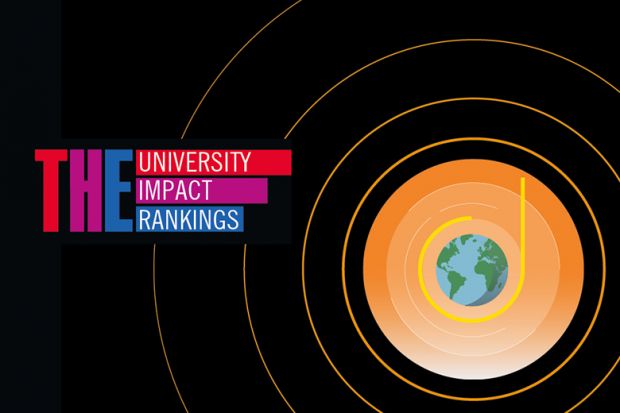View the full results of the overall University Impact Rankings 2019
The University of Auckland has topped a pioneering new ranking that assesses the social and economic impact of universities based on the United Nations’ Sustainable Development Goals (SDGs).
The Times Higher Education University Impact Rankings is the world’s first global attempt to document evidence of universities’ impact on society, rather than just research and teaching performance. Metrics include universities’ policies on academic freedom, their use of secure employment contracts and their share of senior female academic staff and are based on 11 of the 17 UN SDGs.
The results of the first edition reveal a new hierarchy of diverse global institutions compared with research-focused rankings, with New Zealand’s Auckland and two Canadian institutions – McMaster University and the University of British Columbia – forming the overall top three, alongside the UK’s University of Manchester. The rest of the top 10 is completed by King’s College London, Sweden’s University of Gothenburg and KTH Royal Institute of Technology, Canada’s University of Montreal, Italy’s University of Bologna and the University of Hong Kong. The overall ranking includes 462 universities from 76 nations.
THE University Impact Rankings 2019: the top 10
| University Impact 2019 rank | World University Rankings 2019 rank | Institution | Country/region | Overall score |
| 1 | 201-250 | University of Auckland | New Zealand | 97.2 |
| 2 | 77 | McMaster University | Canada | 96.6 |
| =3 | 37 | University of British Columbia | Canada | 96.2 |
| =3 | 57 | University of Manchester | United Kingdom | 96.2 |
| 5 | 38 | King’s College London | United Kingdom | 95.1 |
| 6 | 201-250 | University of Gothenburg | Sweden | 95.0 |
| =7 | 187 | KTH Royal Institute of Technology | Sweden | 94.6 |
| =7 | 90 | University of Montreal | Canada | 94.6 |
| 9 | 180 | University of Bologna | Italy | 94.3 |
| 10 | 36 | University of Hong Kong | Hong Kong | 94.1 |
Phil Baty, chief knowledge officer at THE, said that the rankings “offer an alternative view of university excellence” and “develop an unprecedented picture of the extraordinary impact that universities have across a huge range of activities”.
Patrick Paul Walsh, professor of international development studies at University College Dublin and senior advisor to the UN Sustainable Development Solutions Network, said that it was “the first time that there is a ranking that is getting at social, environmental and partnership impact” alongside “hard data on publications and citations”.
“I think this is a really good initiative. It’s a change in pace but a much-needed one,” he said.
Auckland tops the league table largely thanks to its top scores for two of the goals: good health and well-being, and “partnerships for the goals”. It also achieves a high score for gender equality.
- View the University Impact Rankings 2019 methodology
- Canada, Ireland and Australia lead the way
Almost a third (31 per cent) of Auckland’s graduates in 2017 studied degrees associated with a health-related profession, while nearly half (48 per cent) of its female undergraduates were the first in their family to go to university.
Meanwhile, 43 per cent of its first-degree graduates in science, technology, engineering and mathematics and 78 per cent of its first-degree graduates in medicine in 2017 were women.
Auckland vice-chancellor Stuart McCutcheon also led a successful proposal for all of New Zealand’s universities to collaborate on the SDGs at a national level, while the institution contributed a guide on “Getting started with the SDGs in universities”, which included developing and sharing information on measuring research and teaching contributions to the SDGs.
Professor McCutcheon said that the university benefited from the fact that New Zealand has “a long history of making significant contributions” to society, referencing the country being the first to enfranchise women 125 years ago as one example.
- Universities can lead the way in supporting just and responsible social change
- Universities must walk the talk on sustainable development
- Measures that matter: an innovation that credits social impact
- Measuring social impact allows universities to be held accountable
Auckland is also the most ethnically diverse city in the country, he said, meaning that “the awareness of diversity and the desire to support people from a great diversity of backgrounds is part of our natural environment”.
“A lot of what we’ve done predated the adoption by the UN of the SDGs. But the SDGs give us a kind of framework for thinking about what we’ve been doing and for thinking about where there might be gaps,” he said.
“Our gender and other diversity work has been stronger for longer than say our sustainability and environmental footprint work,” for instance, he added.
McMaster’s main strengths are in the areas of decent work and economic growth, and good health and well-being. The institution pays all its staff and faculty a “living wage” or higher, while 89 per cent of its employees are on contracts of over 24 months.
McMaster also participates in a global initiative to educate the general public about the SDGs and how they can achieved, which includes courses offered through online learning platform Coursera.
Patrick Deane, the university’s president, said that the institution’s purpose was “advancing human and societal health and well-being” and “every part of the university contributes to this whether it’s how we can better address poverty and the social determinants of health, how strengthening inclusivity and equity can build stronger work places, organisations and countries, or leading the world in the fight against antibiotic resistance”.
The university is near one of Canada’s largest Indigenous communities and academics at the institution are “working shoulder to shoulder with these communities to identify causes and develop programmes to improve prevention” of critical health issues including type 2 diabetes and cardiovascular disease, he said.
Meanwhile, the McMaster Community Poverty Initiative “involves students, faculty and staff using research and education to work with a wide range of community partners to get at the heart of poverty and what will make a difference within our own community”.
“What we learn locally also helps us in our international partnerships to address poverty,” Professor Deane said.
At 33rd place, the University of Worcester is the highest-ranked institution in the overall impact table that does not feature in the research-focused THE World University Rankings. Its strongest areas are gender equality and responsible consumption and production.
In 2012, the university opened Europe’s first fully integrated university and public library, while the institution is home to the first indoor sports hall in the UK that was “purpose designed to include the wheelchair athlete”.
The institution’s long-running work with The Learning Institute has also widened university access to students in isolated and deprived communities, most of whom are mature women and many of whom are the first in their family to enter higher education or earn a professional qualification.
David Green, vice-chancellor and chief executive at Worcester, said that the institution was “deeply committed to a democratic culture of inclusion, educational excellence and beneficial impact in society”.
Winners: SDG categories
SDG 3 – Good health and well-being
University of Auckland
Research on key diseases and conditions, support for healthcare professions, and health of students and staff
SDG 4 – Quality education
University of Gothenburg
Contributions to early years and lifelong learning, pedagogy research and commitment to inclusive education
SDG 5 – Gender equality
Western Sydney University
Research on the study of gender, policies on gender equality and commitment to recruiting and promoting women
SDG 8 – Decent work and economic growth
McMaster University
Economics research, employment practices and share of students taking work placements
SDG 9 – Industry, innovation and infrastructure
Yonsei University (Seoul campus)
Research on industry and innovation, number of patents and spin-off companies and research income from industry
SDG 10 – Reduced inequalities
James Cook University
Research on social inequalities, policies on discrimination and commitment to recruiting staff and students from under-represented groups
SDG 11 – Sustainable cities and communities
Kyung Hee University
Research on sustainability, role as custodians of arts and heritage and internal approaches to sustainability
SDG 12 – Responsible consumption and production
University College Cork
Research on responsible consumption and approach to the sustainable use of resources
SDG 13 – Climate action
University of British Columbia
Research on climate change, use of energy and preparations for dealing with consequences of climate change
SDG 16 – Peace, justice and strong institutions
National Taiwan University
Research on law and international relations, participation as advisers for government and policies on academic freedom
SDG 17 – Partnerships for the goals
University of Auckland and University of Manchester
The broader ways in which universities support the SDGs through collaboration with other countries, promotion of best practices and publication of data
Methodology
The THE University Impact Rankings include metrics based on 11 of the 17 UN Sustainable Development Goals across three broad areas: research, outreach and stewardship.
Universities can submit data on as many of the SDGs as they are able. SDG 17 is the only compulsory SDG for inclusion in the overall table.
A university’s final score in the overall table is calculated by combining its score in SDG 17 with its top three scores out of the remaining 10 SDGs. SDG 17 accounts for 22 per cent of the overall score, while the other SDGs each carry a weighting of 26 per cent. This means that different universities are scored based on a different set of SDGs, depending on their focus.
The score from each SDG is scaled so that the highest score in each SDG in the overall calculation is 100.
Universities must submit their own institutional data to be ranked. Bibliometric data come from Elsevier.
View the full methodology.
POSTSCRIPT:
Print headline: Which universities are making an impact?
Register to continue
Why register?
- Registration is free and only takes a moment
- Once registered, you can read 3 articles a month
- Sign up for our newsletter
Subscribe
Or subscribe for unlimited access to:
- Unlimited access to news, views, insights & reviews
- Digital editions
- Digital access to THE’s university and college rankings analysis
Already registered or a current subscriber? Login












